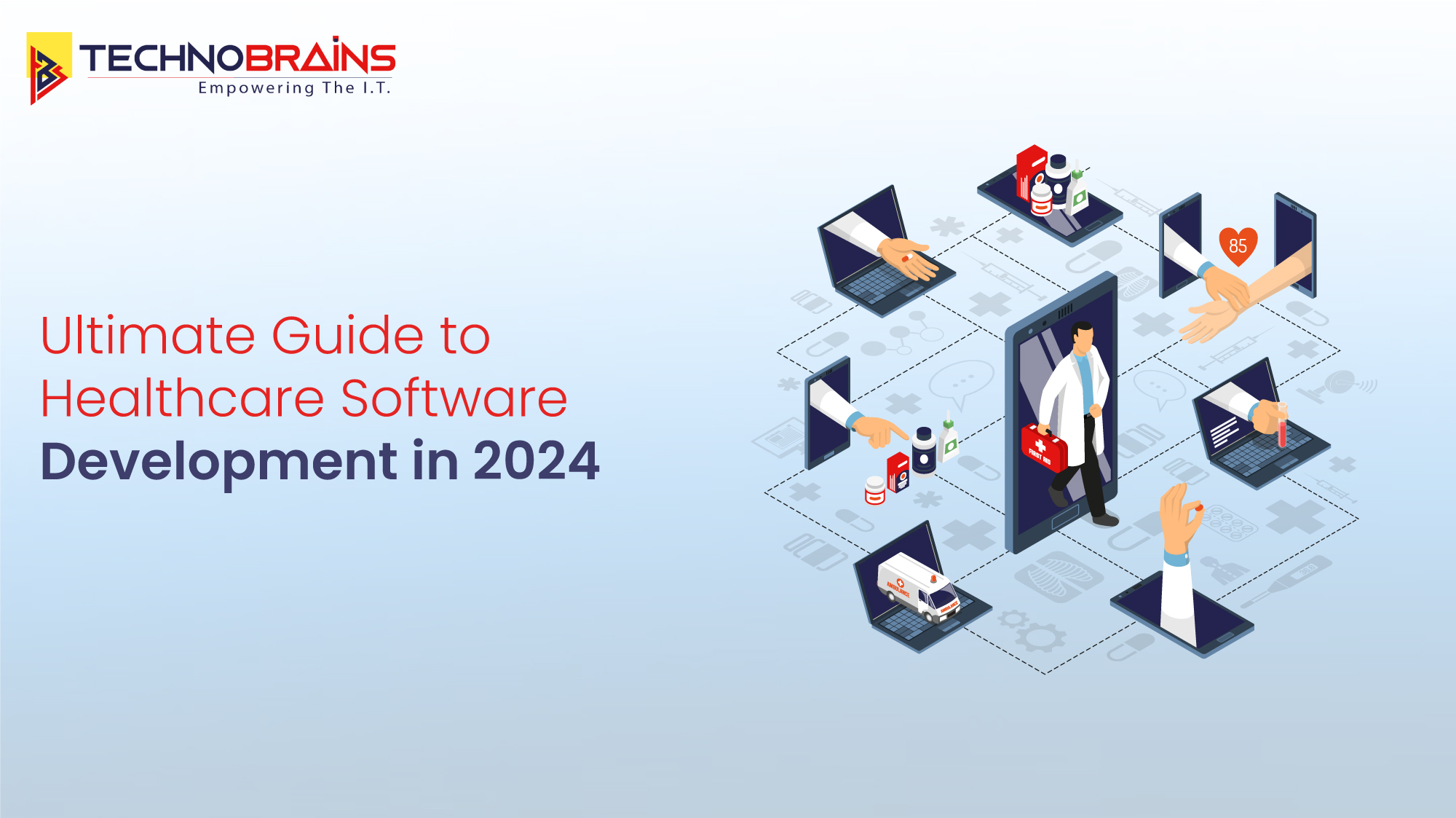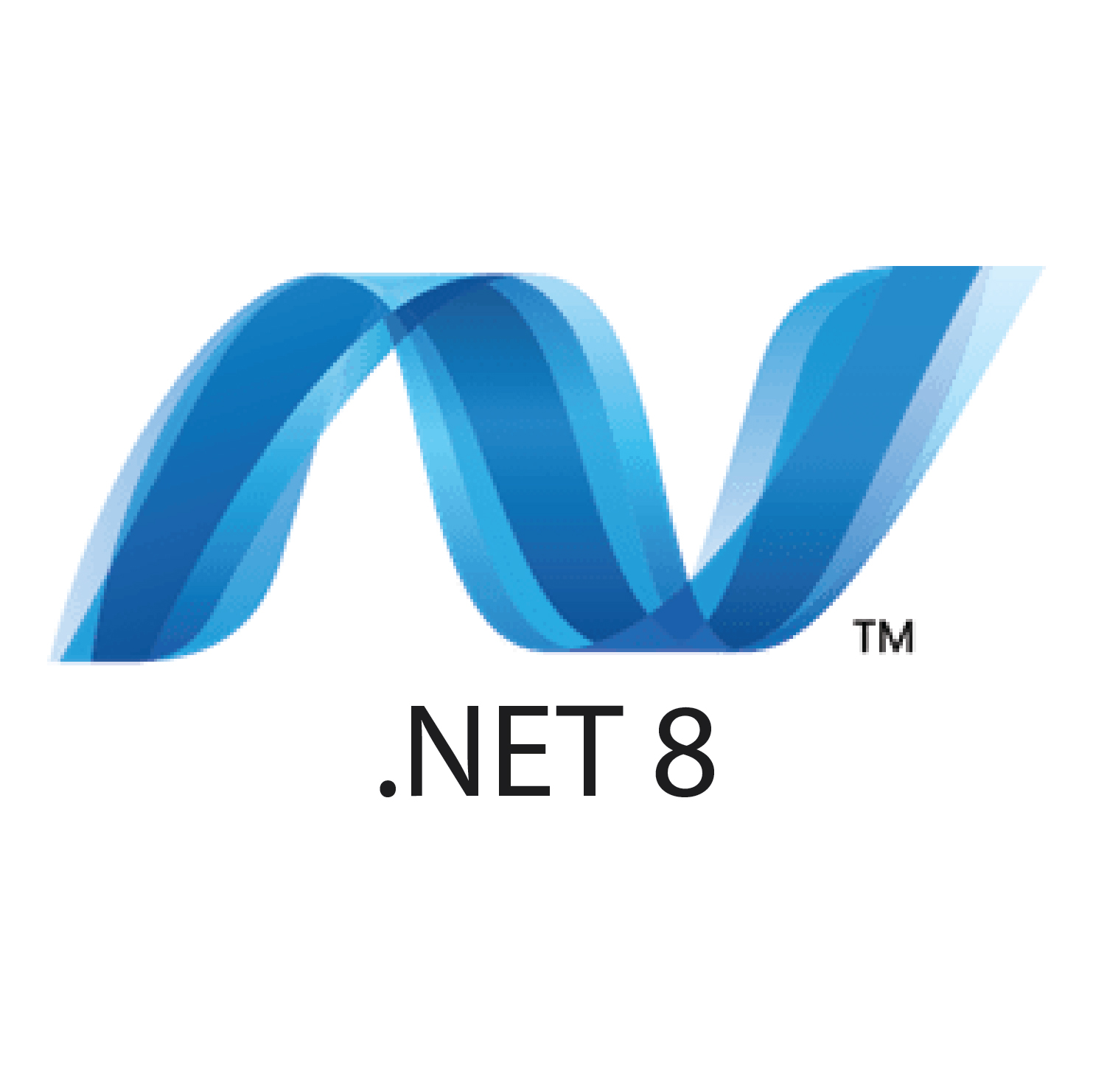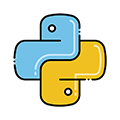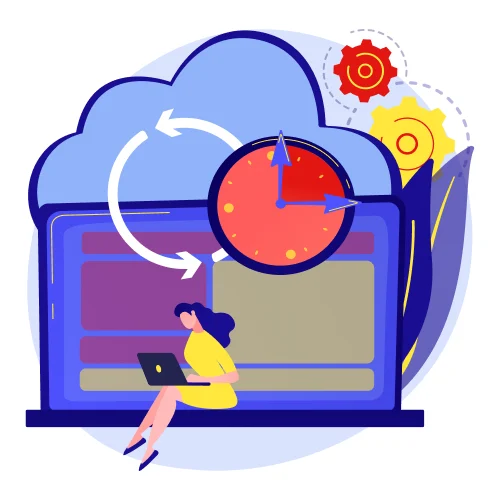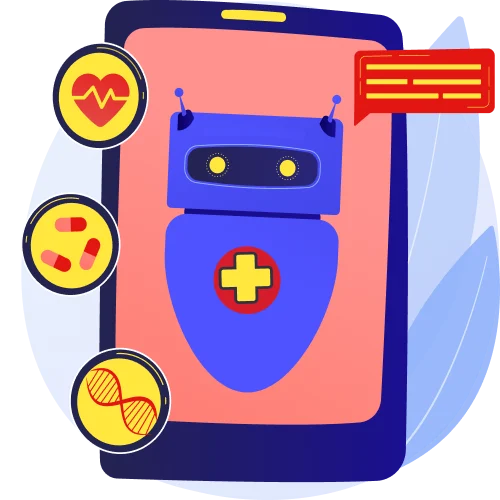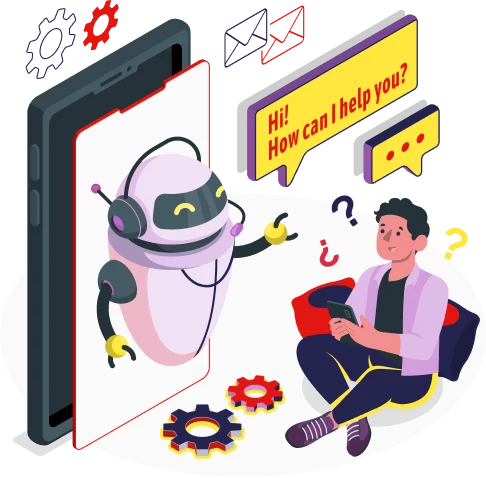Patients want personalized, accurate, and swift healthcare services. Their expectations towards digital healthcare services rise with the advancement of technology. The role of software is important in modern healthcare development.
Healthcare Software Development improves patient care, streamlining healthcare operations. Technology is changing the healthcare sector, influencing how medical decisions are made, and administering treatment.
This blog will serve as a guide to help you understand everything about healthcare software development for a successful digital transformation in healthcare.
What is Healthcare Software Development?
Healthcare software development is the process of creating digital solutions and applications to improve access to healthcare, streamline processes, and protect data from compromise or loss. With the help of Healthcare software interactions between administrative, patients , medical professionals and health administrators will be more smooth.
Healthcare Software Development specializes in improving the quality of care, streamlining interactions, and ensuring privacy and accuracy of record-keeping in various healthcare settings such as hospitals, clinics, research labs, financial service offices, and medical equipment providers.
Benefits of Healthcare Software Development
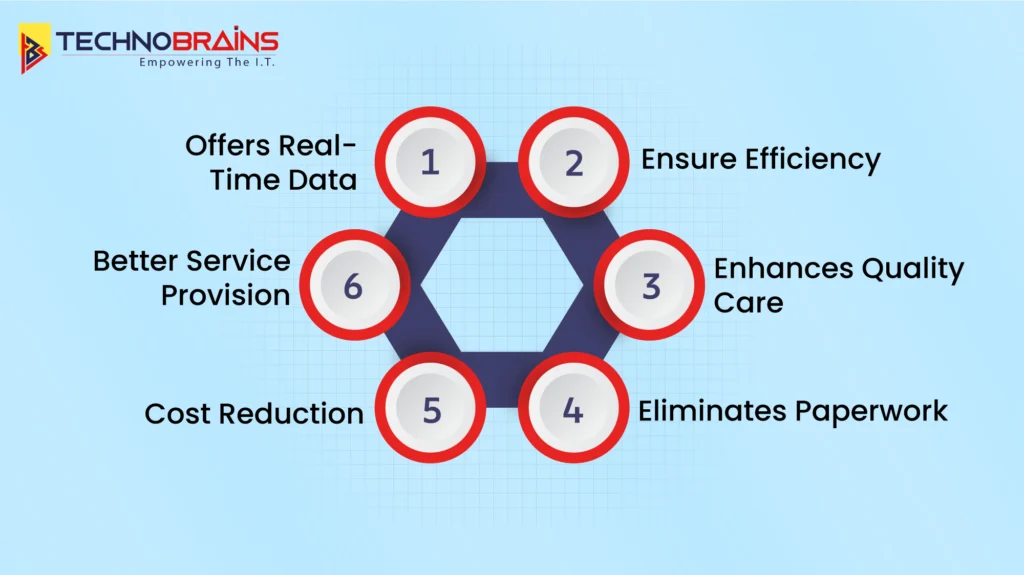
There are numerous benefits of healthcare software; we will cover the top 6 benefits of using Healthcare Software Development
1. Offers Real-Time Data
Healthcare software offers real-time data on health events, prioritizing and identifying the best clinical outcomes. Clinical staff can focus on the most urgent needs first. Doctors have immediate access to information about previous patients, including their arrival at the hospital, health concerns, and any additional services they may require.
2. Ensure Efficiency
Healthcare Software systems help hospitals manage their operations more effectively, automating repetitive manual tasks. They assist in controlling various activities, managing operational expenses, enhancing hospital administration, and providing quick access to data from different departments.
3. Enhances the Quality of Care
Remote Patient Monitoring enhances the quality of care, considering continuous supervision. Personalized technologies allow the integration of various readings obtained from different healthcare professionals.
4. Eliminates Paperwork
Healthcare Software Development eliminates maintaining patient registration records, data storage, form filling, file management, and appointment scheduling. It fully automates the entire process.
5. Cost Reduction
Process Automation allows healthcare organizations to reduce the cost of intervention. It offers a more efficient and cost-effective workflow for healthcare organizations, enabling more flexible and accessible clinical care for people.
6. Better Service Provision
Doctors gain a better understanding of a patient’s needs, which leads to better service provision. On-call doctors can address additional questions patients might have after visiting a hospital or while taking specific medications. Care directives can be provided online through email, video calls, or chat from almost anywhere.
These are the benefits of Healthcare Software Development. Now let’s explore the Latest Healthcare Trends For 2024.
Read Also, Best Practices for HIPAA-Compliant Healthcare Application Development
Latest Healthcare Trends for 2024
Healthcare Trends increased with the rapid pace of technologies. Let’s discuss the latest technology trends for 2024.
Integration of AI & ML into Healthcare
AI speeds up the traditionally slow process of discovering new medicines. AI reduces the time frame, predicting optimal drug candidates, and creating custom medications tailored to specific targets. There are various AI-enabled medical devices available in the market. These include smartwatch sensors capable of detecting atrial fibrillation and advanced algorithms for disease detection through image reconstruction.
Medical facilities develop direct-to-patient solutions offering advice through voice or chat-based interactions, ensuring swift and scalable access to address basic questions and medical concerns. It reduces unnecessary visits to general practitioners, easing the burden on primary healthcare practitioners, and providing essential guidance to populations in remote or underserved areas with limited access to medical expertise.
Blockchain to Manage Supply Chains
Blockchain technology is essential for enhancing healthcare data security. It uses secure encryption to transfer extensive datasets, manage medicine supply chains, and prevent outbreaks of harmful diseases. It addresses the challenge of obtaining a comprehensive view of a patient’s full history and ensuring its security. Blockchain technology contains unique hash functions, serving as digital fingerprints of the information. Blockchains monitor the qualifications and experiences of medical professionals.
The Internet of Medical Things
The Internet of Medical Things detects physiological and biochemical markers, holding great promise for early disease diagnosis, and monitoring chronic diseases. It delivers essential healthcare to remote and rural areas, as well as to individuals who are unable to access traditional healthcare facilities.
AR and VR in Healthcare
With the use of AR and VR technology, clinicians may examine patient data and vital signs in real-time during remote consultations. For patients and healthcare professionals alike, it provides a more engaging and educational experience.
Nanomedicine
Using nanomedicine for early disease detection guarantees prevention and improves medical diagnosis and treatment for a range of illnesses. It functions at the nanoscale by utilizing nanoparticles and nanodevices to interact with biological systems at the molecular and cellular levels.
After exploring the benefits and trends of Healthcare Software Development, let’s move into the different types of Healthcare Software Development.
Different Types of Healthcare Software Development
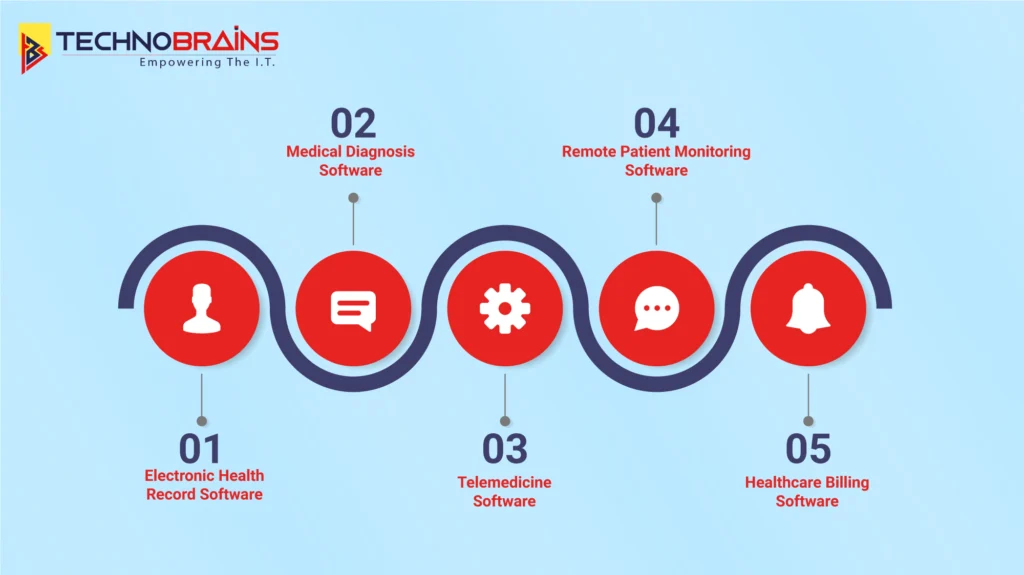
Several Hospitals are implementing the use of various software programs for healthcare to assist practitioners in remotely monitoring patients.Selecting the appropriate software solution is challenging. Let’s examine the different types of software development for the healthcare industry.
1. Electronic Health Record Software
Electronic Health Records encompass details such as prescribed medications, physicians, recommendations, and historical records of undergone procedures. In addition to a financial module for billing and payments, it has a patient portal where patients can view their prescriptions, medical histories, and consultation histories.
2. Medical Diagnosis Software
Physician-facing medical diagnosis software allows doctors to collaborate on diagnosing patients by sharing anonymized patient records. AI collects data, suggesting potential diagnoses. It allows patients to input their symptoms, determining their need to take any medical action. This has helped reduce the workload of healthcare workers during the pandemic.
3. Telemedicine Software
Medical professionals can offer remote patient care, counseling, coaching, and health information thanks to telehealth technologies. Software for telehealth includes a wider variety of medical services.
4. Remote Patient Monitoring Software
Remote Patient Monitoring enables remote diagnosis using the gathered information. It includes a range of gadgets that deliver high-quality medical care, allow for real-time monitoring, and notify physicians or clinics of any anomalies found.
5. Healthcare Billing Software
Healthcare Billing Software streamlines and automates the billing process, including billing the patient parties and insurance providers. It improves the financial flows of the healthcare facility. It increases reimbursement rates, enhancing revenue optimization. It’s maintains the financial health of the healthcare organization, tracking and automating the financial flow.
These are the benefits, trends, and different types of healthcare software development. Let’s discuss the healthcare software development process.
Read Also, Why Flutter is Ideal for Healthcare App Development
Healthcare Software Development Process
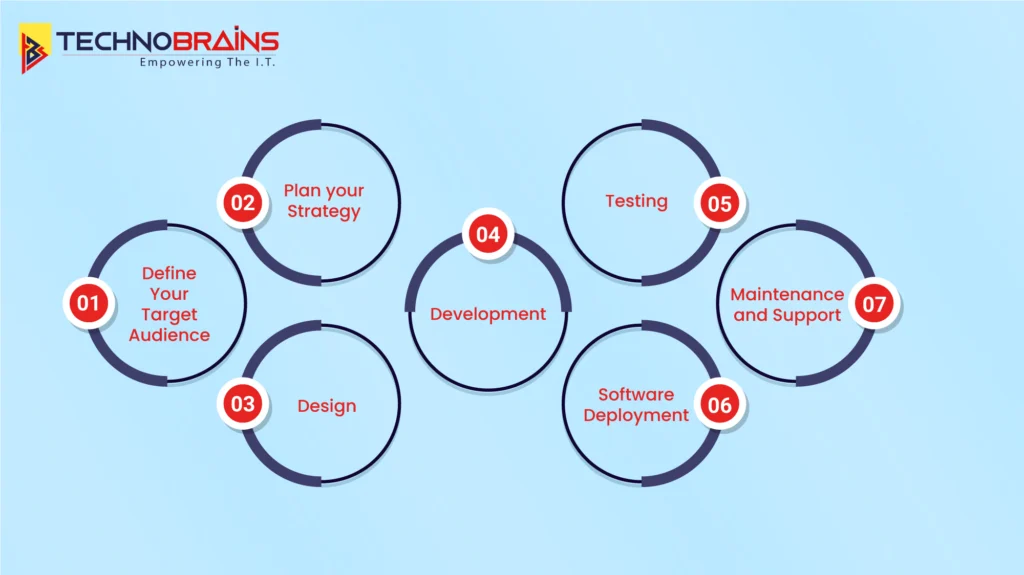
Different organizations follow different steps of the Healthcare software development process. However, we have outlined the crucial stages for creating a strong healthcare app that you should follow:
Step 1: Define Your Target Audience
Determining who your target audience is is essential. It is critical to have a thorough awareness of the various needs, preferences, and issues of your target audience to develop a solution that addresses their unique needs.
Step 2: Plan your Strategy
Identify the specific healthcare challenge or need your software will address. It is essential to clarify this before proceeding further, forming the foundation of your project.
Step 3: Design
Develop user personas based on your target audience to identify their needs, preferences, and challenges. Create wireframes to visualize the software’s layout, navigation, and interactions. Adjust these designs based on feedback and usability testing. Make sure your user interface design is aesthetically pleasing, user-friendly, and available to all people. Work together with UX designers and healthcare experts to create workflows that optimize clinical operations and increase user productivity.
Step 4: Development
This stage involves developing the frontend and backend, integrating third-party APIs, and adhering to healthcare development best practices while considering industry compliances.
Step 5: Ensure Testing
Testing ensures seamless software functioning, eliminating bugs. It includes functional vulnerability,
accessibility, integration, and usability testing.
Step 6: Software Deployment
Develop a phased deployment plan for gradual software integration. Test for issues before full implementation. Provide comprehensive user training.
Step 7: Maintenance and Support
It is essential to maintain the software for the long-term success of your healthcare software development. Provide prompt technical support to address user inquiries, issues, and feedback. Continuously monitor the software’s performance.
These are the essential steps to follow in the development of healthcare software. Now, Let’s dive into the cost of the various types of healthcare software.
Cost of Healthcare Software Development in 2024
The cost of healthcare software development varies for each user based on their specific demands. Now, we will cover some important points on the cost of Healthcare Software Development in 2024.
Cost to Build Telemedicine Software
Telemedicine apps revolutionize healthcare delivery, allowing patients and healthcare providers to connect remotely, enabling timely consultations and improving accessibility. By facilitating remote connections between patients and healthcare professionals, telemedicine apps transform the way healthcare is delivered by facilitating prompt consultations and enhancing accessibility. Its cost ranges from $20,000 to $250,000.
Cost to Build e-Prescribing Software
Electronic prescription applications streamline the prescription process, offering a secure and efficient way for healthcare professionals to transmit prescriptions to pharmacies. The development cost for a personalized E-prescription app ranges from $10.000 to $70,000.
Cost to Build Electronic Health Records Software
Electronic Health Records (EHR) digitize patient records, providing a comprehensive and centralized platform for healthcare information. The development costs of an EHR system range from $15,000 – $100,000.
Cost to Build Remote Patient Monitoring Software
Remote Patient Monitoring Software allows healthcare professionals to continuously monitor and intervene as necessary. It provides real-time tracking of patients’ health metrics and costs between $40,000 and $250,000.
Cost to Build Hospital Management Software
Hospital Management Software optimizes administrative processes, resources, and healthcare efficiency, costing $10,000 to $200,000.
Cost to Build Medical Diagnosis Software
Medical Diagnosis Software ensures compatibility across imaging devices, enabling efficient diagnosis, treatment planning, and patient care. It costs around $30,000 to $450,000.
Read Also, How Mobile Apps Are Reshaping the Healthcare Frontier?
Why TechnoBrains for Healthcare Software Development?
TechnoBrains offers robust software solutions to businesses and industries all across the globe, using expert technologies. Our IT consultants can help you with software technical design, feature mapping, regulatory compliance, software cost estimation, ROI analysis, marketing and adoption strategy development, project planning and improvement, and training for your in-house team.
1. Technological Expertise
TechnoBrains provides high-quality healthcare software development services to clients, utilizing the latest development tools to help achieve business objectives. We offer you the best solutions available by utilizing state-of-the-art technologies. We have expertise developing software that complies with HIPAA.
2. Industry Knowledge
At TechnoBrains, we have served across different countries, boasting several hundred clients. We adopt industry-leading technologies to make an efficient team.
3. Experienced Developers
We have a highly skilled panel of highly qualified experts to satisfy clients worldwide. Our quality control measures ensure that the services you receive are of the highest quality and precisely tailored to your needs, budget, and timeline.
4. Scalability
By utilizing advanced security measures, such as advanced data encryption and a secure admin dashboard, we ensure the advanced level of scalability & safety of mobile applications.
5. Security
We guarantee our clients a scalable project that can be adjusted in size as needed. Integration in the cloud environment eliminates the need for software updates and the platform frequently upgrades its software, eliminating the cost and effort required for software upgrades.
6. Provide Custom Healthcare Software Development
At TechnoBrains, we offer tailor-made healthcare software development, according to your needs and requirements. We leverage platforms to develop scalable and user-friendly custom healthcare software development services for our clients.
7. Cost-Effective Services
TechnoBrains offers optimized and cost-effective services to their clients. We target your customers and leads, incorporating Analytics and Performance metrics. We aspire to deliver CRM solutions to our clients.
Wrapping Up
It is important to prioritize user-friendly design, interoperability, and continuous testing to create secure and scalable solutions that empower patients and revolutionize healthcare. It is essential to keep exploring, stay updated, and continuously develop your skills to thrive in this rapidly evolving field.
As a leading software development company, TechnoBrains is ready to lead your custom healthcare software development project. Our team combines extensive industry knowledge, technical expertise, and a commitment to data security and privacy, ensuring a customized solution to meet your specific needs.
Talk to our experts and discover how the latest health tech software can impact your business or project. Still stuck with questions? Contact us now and get answers to all your questions.
